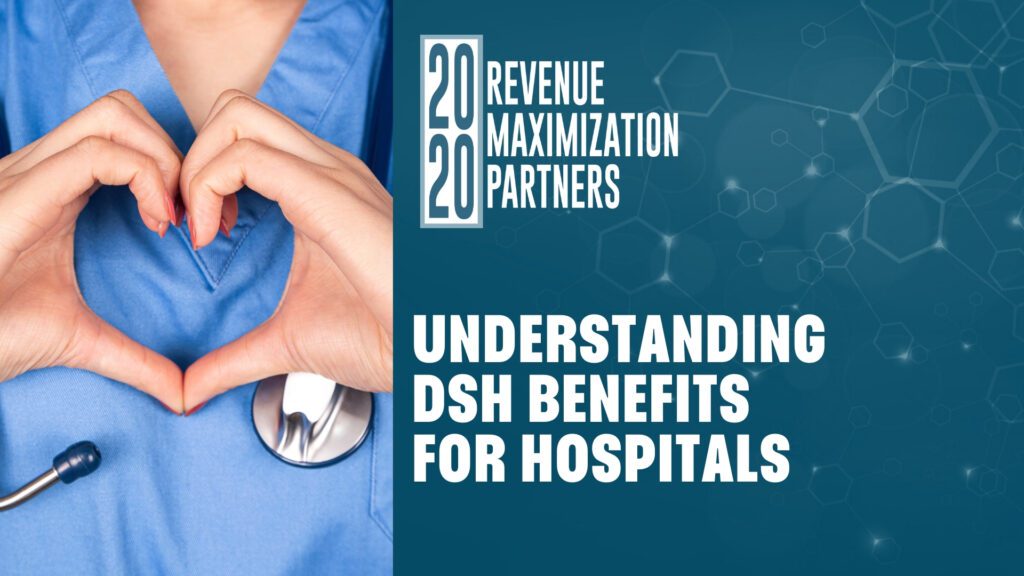Today, more than ever, creating financial stability in hospitals is a challenge. Non-profit hospitals struggle with a common struggle factor, uncompensated care and Medicaid redetermination. Qualifying for and utilizing programs such as DSH provides funding to cover uncompensated care.
What is the DSH Program?
The Medicaid disproportionate share hospital (DSH) program was created in 1981 by the government to help hospitals that serve many low-income and uninsured patients remain financially viable by funding to cover the care of uninsured low-income patients. This funding aims to help offset the costs of care provided to these uninsured patients, ensuring that the hospital can continue to provide necessary services to these vulnerable populations.
To qualify for the DSH payments hospitals must serve a high percentage of Medicaid and uninsured patients. Each state determines which hospitals qualify based on criteria set by both federal and state regulations.
Key Benefits of DSH for Hospitals
Financial Support for Serving Low-Income Patients
The primary purpose of DSH payments is to support hospitals that might otherwise struggle financially due to the high volume of uncompensated care they provide. DSH payments are funded through a combination of federal and state funds. The federal government allocates a specific amount of DSH funding to each state, the state then distributes these funds to eligible hospitals based on state-specific formulas.
CMS standard formula
DSH Patient Percent = (Medicare SSI Days / Total Medicare Days) + (Medicaid, Non-Medicare Days / Total Patient Days)
In fiscal year (FY) 2021, Medicaid made a total of $18.9 billion in DSH payments
Enhancing Access to Healthcare Services
Federal DSH payments are crucial for maintaining the financial stability of safety-net hospitals. These hospitals play a vital role in providing care to underserved communities. DSH payments help cover the gap between the cost of care and the reimbursements received.
Subsidizing Uncompensated Care Costs
The structure and amount of DSH payments can be affected by changes in federal and state policies. Reductions in DSH funding, which have been proposed at various times, pose a significant challenge to safety-net hospitals, potentially impacting their ability to serve vulnerable populations.
In February 2024 CMS published a final rule that would reduce Medicaid DSH payments for some safety-net hospitals by $8 billion annually from 2024 to 2027. But on March 8, 2024, Congress passed a spending package extending the cuts to Jan 1, 2025.
Supporting Hospital Operations
DSH payments are essential for maintaining the operational stability of hospitals serving a large number of low-income and uninsured patients. By offsetting uncompensated care costs, enabling infrastructure and technology investments, and supporting vulnerable populations, DSH payments help ensure that these hospitals can continue to provide essential healthcare services to their communities.
Challenges and Considerations
While DSH payments provide essential financial support to hospitals serving vulnerable populations, the challenges in obtaining and utilizing these funds are significant. Hospitals must navigate complex eligibility criteria, uncertain funding levels, and stringent reporting requirements. They must strategically manage these funds to balance immediate patient care needs with long-term investments in infrastructure and technology. Addressing these challenges requires collaboration between hospitals, policymakers, and community organizations to ensure that DSH funds are effectively used to support the health and well-being of underserved populations.
DSH Provides Financial Support
DSH payments are an essential component of the healthcare safety net, providing critical financial support to hospitals that serve a high number of low-income and uninsured patients. By helping to offset the costs of uncompensated care, DSH payments enable these hospitals to continue offering essential health services to those who need them most. Understanding the role and importance of DSH payments can help stakeholders advocate for policies that ensure the continued availability of care for vulnerable populations.
20/20 Revenue Maximization Partners
At 20/20 Revenue Maximization Partners (20/20 RMP), we empower hospitals with cutting-edge, secure solutions like health insurance coverage discovery and eligibility technology that can identify missed Medicaid-eligible days for hospitals to meet the minimum requirement for 340B DSH qualification and reimbursement. Our proven efforts discovered an additional 320 IP days for a hospital in Georgia resulting in the hospital recovering over 10 million dollars – read the case study. We operate on a 100% contingency-based pricing for undiscovered coverages we identify plus a minimal flat rate for finding additional DSH days to help hospitals exceed the days threshold needed to qualify for DSH reimbursement per fiscal year; you only pay when we recover lost revenue for your organization. To learn more about our services contact us at info@2020rmp.com or visit https://2020rmp.com/contact/.
References:
Cao, D. (2023, July 26). Disproportionate share hospital payments – MACPAC. MACPAC. https://www.macpac.gov/subtopic/disproportionate-share-hospital-payments/
Disproportionate Share Hospital (DSH). CMS.gov. (n.d.-a). https://www.cms.gov/medicare/payment/prospective-payment-systems/acute-inpatient-pps/disproportionate-share-hospital-dsh


